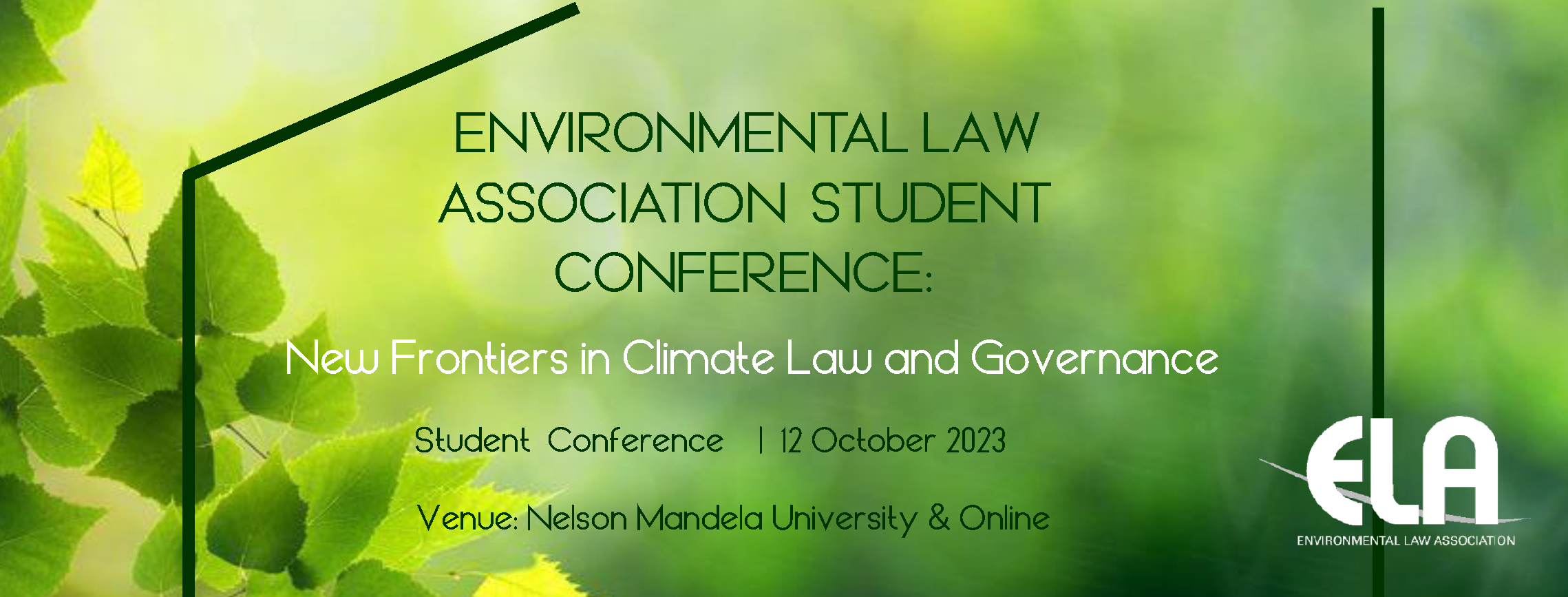The ELA Student Conference: New Frontiers in Climate Law and Governance, 12 October 2023
Climate change is one of the most pressing contemporary global challenges, with a host of justice implications. Young people and future generations are among the most affected. This context is a catalyst to reflect on whether and to what extent environmental law and governance measures are adequately responding to climate change. Accordingly, in 2023 we invited students in the field of environmental law to present their current and recently completed research through the lens of the need for new frontiers in climate law and governance. At the conference, student presenters benefitted from expert input (from legal practitioners and academics) on their current and completed research on environmental law. Whilst the focus of our conference was climate law and governance, students also presented on other relevant topics.
Students who recently completed or who are working on research focused on Environmental Law issues:
- Presented on ongoing or completed research with fellow students and experts in Environmental Law at our Student Conference.
- Received feedback from leading experts.
- Networked with peers, academics and practitioners.

Best presenter prizes:
The best presenters at the Student Conference were awarded prizes:
- Adelaide Karamo was recognized overall for her stellar presentation titled ‘Comprehensive Marine Environmental Protection Laws: A Prerequisite for South Africa to Sponsor Mineral Mining Activities in the Area under the UNCLOS Regime?’. She was awarded R2000. Adelaide is a PhD candidate at Nelson Mandela University, where she is reading towards her doctorate on the law of the sea. In 2023 she co-authored and published an insightful paper in Obiter on underwater noise pollution.
- Cassius Ali Latlhang was awarded joint best presenter in the LLM category, for his presentation titled ‘The Chaotic Peri-urbanisation Around Gaborone, Botswana; Can Tenure Security and Spatial Planning Law come to the Rescue?’, who was awarded R750. He is an LLM Researcher at NWU CLES who completed his LLB degree at the University of Botswana in Gaborone. He is the recipient of the 2022 KAS Regional Programme Energy Security and Climate Change in Sub-Saharan Africa Scholarship. His research straddles property law, land law, urban law and some aspects of constitutional law.
- Viandrie Robertson was awarded joint best presenter in the LLM category for her presentation titled ‘Local governance instruments and environmental law compliance: the case of Knysna Municipality’. She is is an LLM researcher with the South African Research Chair: Cities, Law and Environmental Sustainability at the North West University, Potchefstroom, and sits on the Student Sub-committee of the ELA.



Cassius’ presentation noted that Botswana is experiencing high rates of urbanisation. The UN projects that 84 percent of Botswana’s population will be living in urban centres by 2050. This is often accompanied by economic development. The country’s rapid urbanisation has been attributed to factors such as rural urban migration, the natural increase in population and settlement reclassification. This rapid urbanisation brings with it a plethora of challenges such as a rise in land use conflicts, urban sprawl leading to encroachment of agricultural and customary land that surrounds urban centres, shortage of land and housing and illegal land transactions. Gaborone, the capital of Botswana is surrounded by mainly freehold farms and tribal land. This leads to the phenomenon of peri-urbanisation. Peri-urbanisation involves uneven land-use and livelihoods change affecting the perimeter of growing or stable urban areas. Gaborone is sprawling into tribal lands such as Mogoditshane, Mmopane and Tlokweng where these land use challenges are mainly felt. The question that the presentation sought to answer was: How could the land tenure security and spatial planning of Botswana control the impacts of peri-urbanisation around the Gaborone peripheries? Land tenure defines ways in which property rights are held and assigned in different societies. Botswana has inherited a three-tier land tenure system from Britain. Tenure security refers to the guarantee that landowners will not be deprived their rights, and they will be recognised by others. Over the years Botswana has brought about tenure reforms which has improved its tenure security. This includes through the enactment of laws such as the Tribal Land Act 1 of 2018, State Land Act Cap 32:01, Land Surveys Act Cap 33:01 and the Land Control Act Cap 32:11. In the presentation, it was argued that for the land tenure security to effectively respond to rapid urbanisation, there is need to intertwine it with spatial planning law. The centrepiece of spatial planning law in Botswana is the Town and Country Planning Act which is aimed at providing an orderly and progressive development of Botswana. Other instruments include the development control codes, plans and development standards. The relationship between land tenure and spatial planning law is not an obvious one, however both play an important role in driving a country’s development agenda. Spatial planning laws helps with record-keeping for boundaries, this minimises tenure related conflicts and improve tenure security. Spatial planning law also plays a special role in controlling urban sprawl, for example, under the TCPA one is not allowed to develop the land without planning permission from the planning authority.
Essay competition winners:
The 2022/2023 Student Essay Competition prize winners were announced at the Student Conference.
Michaela Tafani was awarded first prize in the Postgraduate category for her essay, ‘Seismic Surveys and Whales: An Animal Rights Response to Extractivism off the South African Coast’. She won R3000 and will be supported in publishing her essay.

Michaela is an admitted attorney with an interest in environmental and animal law. She is the Programme Lead for Animal Law Reform South Africa’s Corporate Accountability Project, which aims to shed light on the realities of the egg industry of South Africa. During 2019, Michaela was awarded the prize for the ELA Student Essay Competition for her LL.B mini-dissertation titled ‘Towards an Ecocentric Orientation of Laws Regulating Animal Testing for Cosmetic Purposes in South Africa’. Michaela is grateful to accept the award for the 2023 ELA Student Essay Competition for her LL.M mini-dissertation. She dedicates the achievement to Nigel, her Staffordshire Terrier who passed away recently. Nigel was there through every sleepless night, providing a shoulder to cry on and a belly to lie on. She would not be anywhere as inspired as she is today without him.
Adelaide Chagopa was awarded runner-up prize in the Postgraduate category for her essay, ‘Minimum Core Obligations: Re-evaluating the realisation of the right to water in South Africa’. She won R1500 and will be supported in publishing her essay.

Adelaide is an aspiring human rights and environmental law lawyer and academic. She is deeply passionate about human rights and the environment, particularly water and sustainability. Adelaide completed her LLB degree in 2016 at Wits University. It was during this time that her interest in environmental law blossomed, so much so, that she went on to read for the LLM in environmental rights at Wits University where her research project focused on water resource management. Her interest in facilitating access to water for all led her to study further and pursue an LLM in Multidisciplinary Human Rights at the University of Pretoria where her dissertation tackled quantifying access to water through minimum core obligations. She is currently an LLD candidate at the University of Pretoria. Through the years Adelaide has been a part of various projects including being a volunteer rapporteur at the COP26 Water Pavilion; tracking the Constitutional Court’s activities and co-authoring reports on that which were published in the SAJHR as well as being a part of the student law journal at the University of Pretoria since 2020. Adelaide hopes that through her work she can be a positive force for change and help pursue a sustainable future where resources are shared and enjoyed equally by all.
We wish to congratulate Michaela and Adelaide as well as all the other entrants to our competition for their wonderful environment law scholarship. For more information, look here.
The Student Conference took place online and in person at Nelson Mandela University, Gqeberha, with huge thanks to our host, ELA Exco member, Dr Tanya Wagenaar.
Check out the programme here.
ELA Student Conference Programme rev07
After the conference…




